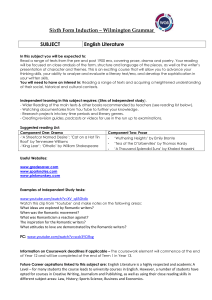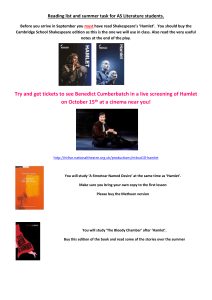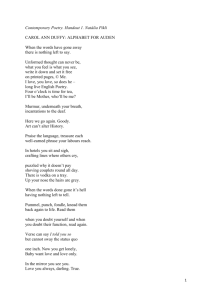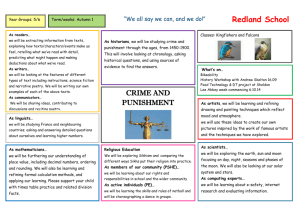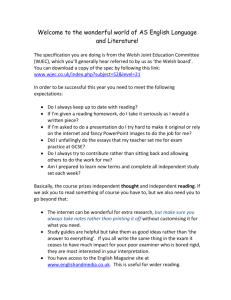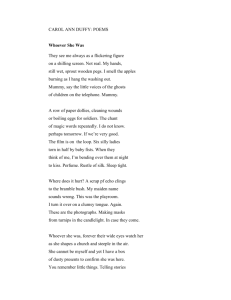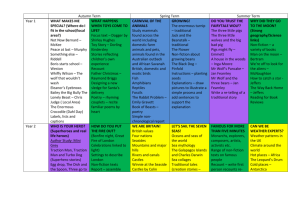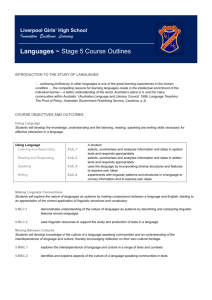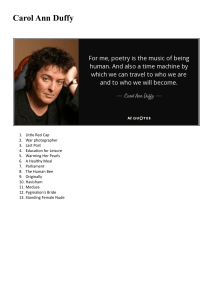English Language and Literature - Wilmington Grammars` Sixth
advertisement
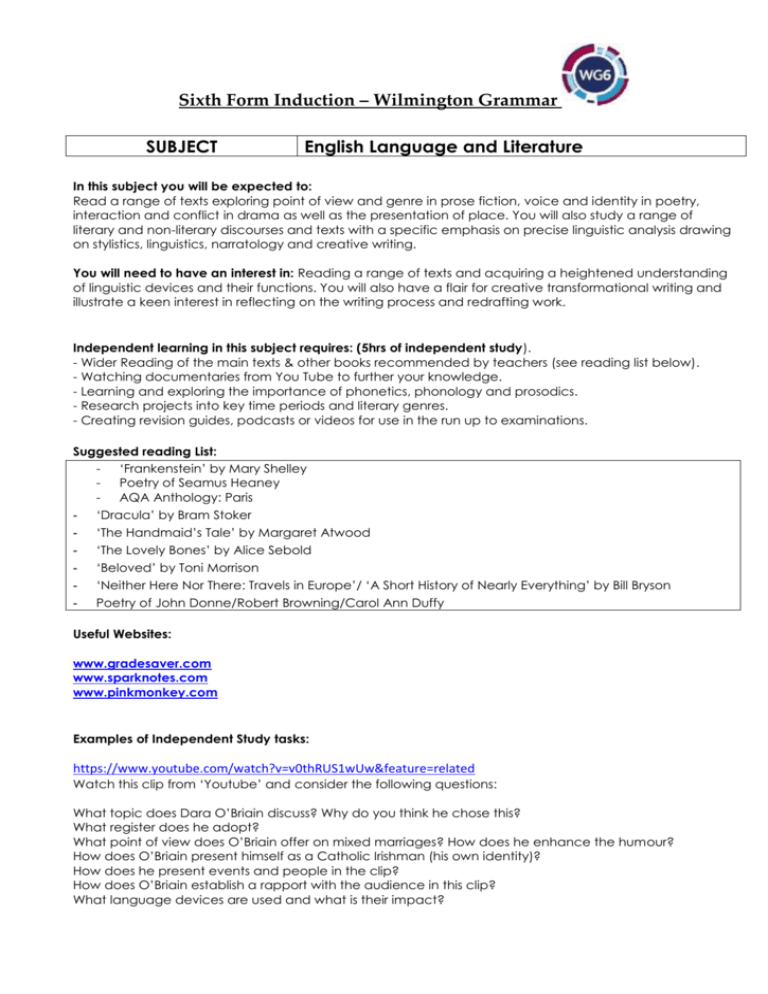
Sixth Form Induction – Wilmington Grammar SUBJECT English Language and Literature In this subject you will be expected to: Read a range of texts exploring point of view and genre in prose fiction, voice and identity in poetry, interaction and conflict in drama as well as the presentation of place. You will also study a range of literary and non-literary discourses and texts with a specific emphasis on precise linguistic analysis drawing on stylistics, linguistics, narratology and creative writing. You will need to have an interest in: Reading a range of texts and acquiring a heightened understanding of linguistic devices and their functions. You will also have a flair for creative transformational writing and illustrate a keen interest in reflecting on the writing process and redrafting work. Independent learning in this subject requires: (5hrs of independent study). - Wider Reading of the main texts & other books recommended by teachers (see reading list below). - Watching documentaries from You Tube to further your knowledge. - Learning and exploring the importance of phonetics, phonology and prosodics. - Research projects into key time periods and literary genres. - Creating revision guides, podcasts or videos for use in the run up to examinations. Suggested reading List: - ‘Frankenstein’ by Mary Shelley - Poetry of Seamus Heaney - AQA Anthology: Paris - ‘Dracula’ by Bram Stoker - ‘The Handmaid’s Tale’ by Margaret Atwood ‘The Lovely Bones’ by Alice Sebold ‘Beloved’ by Toni Morrison ‘Neither Here Nor There: Travels in Europe’/ ‘A Short History of Nearly Everything’ by Bill Bryson Poetry of John Donne/Robert Browning/Carol Ann Duffy Useful Websites: www.gradesaver.com www.sparknotes.com www.pinkmonkey.com Examples of Independent Study tasks: https://www.youtube.com/watch?v=v0thRUS1wUw&feature=related Watch this clip from ‘Youtube’ and consider the following questions: What topic does Dara O’Briain discuss? Why do you think he chose this? What register does he adopt? What point of view does O’Briain offer on mixed marriages? How does he enhance the humour? How does O’Briain present himself as a Catholic Irishman (his own identity)? How does he present events and people in the clip? How does O’Briain establish a rapport with the audience in this clip? What language devices are used and what is their impact? Future Career aspirations linked to this subject are: English Language and Literature is a respected program of study offering an excellent opportunity to explore the role of linguistic devices in literary and non-literary texts. It provides an effective consolidation of GCSE skills and a strong foundation for other A Level subjects. For example, a student’s close reading skills may be utilised in different subject areas such as: Law, History; Sports Science, Business and Economics. Induction Task & Success Criteria 1. Write an analytical essay on the attached poem (‘Little Red Cap’ by Carol Ann Duffy) based on the following task: How does Duffy present the life journey of Little Red Cap? What life lessons does she learn? Pay particular attention to how Duffy shapes the poem as well as the linguistic and poetic techniques utilised. Aim to write an introduction, four paragraphs and a conclusion. 2. Read one of the texts from the suggested reading list and write a one page review of it. You will need to include sections on: the main characters, the themes presented by the writer and important quotes. If you are having problems with the task and need some advice please contact arussell@wgsb.org.uk Deadline First lesson in September Little Red Cap – Carol Ann Duffy At childhood's end, the houses petered out into playing fields, the factory allotments kept, like mistresses, by kneeling married men, the silent railway line, the hermit's caravan, till you came at last to the edge of the woods. It was there that I first clapped eyes on the wolf. He stood in a clearing, reading his verse out loud in his wolfy drawl, a paperback in his hairy paw, red wine staining his bearded jaw. What big ears he had! What big eyes he had! What teeth! In the interval, I made quite sure he spotted me, sweet sixteen, never been, babe, waif, and bought me a drink, my first. You might ask why. Here's why. Poetry. The wolf, I knew, would lead me deep into the woods, away from home, to a dark tangled thorny place lit by the eyes of owls. I crawled in his wake, my stockings ripped to shreds, scraps of red from my blazer snagged on twig and branch, murder clues. I lost both shoes but got there, wolf's lair, better beware. Lesson one that night, breath of the wolf in my ear, was the love poem. I clung till dawn to his thrashing fur, for what little girl doesn't dearly love a wolf? Then I slid from between his hairy matted paws and went in search of a living bird - white dove which flew, straight, from my hands to his open mouth. One bite, dead. How nice, breakfast in bed, he said, licking his chops. As soon as he slept, I crept to the back of the lair, where a whole wall was crimson, gold, aglow with books. Words, words were truly alive on the tongue, in the head, warm, beating, frantic, winged; music and blood. But then I was young - and it took ten years in the woods to tell that a mushroom stoppers the mouth of a buried corpse, that birds are the uttered thoughts of trees, that a greying wolf howls the same old song at the moon, year in, year out, season after season, same rhyme, same reason. I took an axe to a willow to see how it wept. I took an axe to a salmon to see how it leapt. I took an axe to the wolf as he slept, one chop, scrotum to throat, and saw the glistening, virgin white of my grandmother's bones. I filled his cold belly with stones. I stitched him up. Out of the forest I come, with my flowers, singing, all alone.
